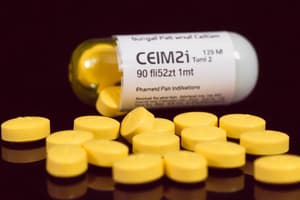Podcast
Questions and Answers
A patient with a history of peptic ulcers requires an NSAID for pain relief. Which of the following medications would be LEAST appropriate, considering their medical history?
A patient with a history of peptic ulcers requires an NSAID for pain relief. Which of the following medications would be LEAST appropriate, considering their medical history?
- Low-dose Aspirin (correct)
- Ibuprofen
- Celecoxib
- Acetaminophen
A patient taking an NSAID reports experiencing heartburn and epigastric pain. Which mechanism of action of the NSAID is MOST likely responsible for these symptoms?
A patient taking an NSAID reports experiencing heartburn and epigastric pain. Which mechanism of action of the NSAID is MOST likely responsible for these symptoms?
- Inhibition of COX-1, leading to decreased production of protective prostaglandins in the stomach. (correct)
- Increased production of thromboxane A2, leading to vasoconstriction.
- Inhibition of COX-2, leading to decreased prostacyclin production.
- Direct stimulation of gastric acid secretion.
A patient with a known hypersensitivity to acetaminophen accidentally overdoses on the medication. Which of the following is the MOST appropriate immediate action?
A patient with a known hypersensitivity to acetaminophen accidentally overdoses on the medication. Which of the following is the MOST appropriate immediate action?
- Administer N-acetylcysteine (NAC) to counteract hepatotoxicity.
- Induce vomiting to remove the excess medication.
- Monitor liver function tests and provide supportive care. (correct)
- Administer activated charcoal to reduce absorption.
Which of the following best describes the PRIMARY mechanism of action of acetaminophen in reducing fever?
Which of the following best describes the PRIMARY mechanism of action of acetaminophen in reducing fever?
A patient with a history of ischemic heart disease requires an analgesic. Which of the following NSAIDs would be MOST contraindicated?
A patient with a history of ischemic heart disease requires an analgesic. Which of the following NSAIDs would be MOST contraindicated?
A patient is prescribed low-dose aspirin for its antiplatelet effects. Which of the following mechanisms explains how aspirin reduces platelet aggregation?
A patient is prescribed low-dose aspirin for its antiplatelet effects. Which of the following mechanisms explains how aspirin reduces platelet aggregation?
A patient with osteoarthritis is taking naproxen for pain relief. What potential adverse effect should the patient be counseled on?
A patient with osteoarthritis is taking naproxen for pain relief. What potential adverse effect should the patient be counseled on?
A child presents with a fever, and acetaminophen is chosen as the antipyretic. What is the PRIMARY reason acetaminophen is preferred over aspirin in children?
A child presents with a fever, and acetaminophen is chosen as the antipyretic. What is the PRIMARY reason acetaminophen is preferred over aspirin in children?
Flashcards
Selective COX-1 Inhibitors: MOA
Selective COX-1 Inhibitors: MOA
Inhibits COX-1, reducing PGE2, PGI2, and TxA2 production.
Selective COX-1 Inhibitors: Side Effects
Selective COX-1 Inhibitors: Side Effects
GI bleeding, ulcers, kidney issues, reduced clotting due to TxA2 inhibition.
Non-Selective COX Inhibitors: MOA
Non-Selective COX Inhibitors: MOA
Inhibit both COX-1 and COX-2, reducing PGE2, PGI2, and TxA2.
Selective COX-2 Inhibitors: Side Effects
Selective COX-2 Inhibitors: Side Effects
Signup and view all the flashcards
NSAIDs: Indications
NSAIDs: Indications
Signup and view all the flashcards
NSAIDs (Non-Selective & COX-1): Contraindications
NSAIDs (Non-Selective & COX-1): Contraindications
Signup and view all the flashcards
Selective COX-2 Inhibitors: Contraindications
Selective COX-2 Inhibitors: Contraindications
Signup and view all the flashcards
Acetaminophen: MOA
Acetaminophen: MOA
Signup and view all the flashcards
Study Notes
- COX-1 inhibitors include ketorolac, ketoprofen, and low-dose aspirin
- COX-1 inhibitors decrease PGE2, PGI2, and TxA2
- Side effects of COX-1 inhibitors include GI bleeding, peptic ulcers, kidney injury, and decreased bleeding
- COX-1 inhibitors indicated for pain, fever and inflammation relief.
- COX-1 inhibitors are contraindicated in bleeding disorders and heart failure
Non-Selective COX Inhibitors
- Non-selective COX inhibitors include naproxen and ibuprofen
- Non-selective COX inhibitors decrease PGE2, PGI2, and TxA2
- Side effects include GI bleeding, peptic ulcers, kidney injury, and decreased bleeding
- Non-selective COX inhibitors indicated for pain, fever and inflammation relief.
- Non-selective COX inhibitors are contraindicated in bleeding disorders, heart failure and GI bleeding
Selective COX-2 Inhibitors
- Selective COX-2 inhibitors include celecoxib, valdecoxib, and diclofenac
- Selective COX-2 inhibitors decrease PGI2
- Side effects include myocardial infarction, stroke, decreased prostacyclin (PGI2), and kidney injury
- Selective COX-2 inhibitors indicated for pain, fever and inflammation relief.
- Selective COX-2 inhibitors are contraindicated in ischemic heart disease, heart failure, stroke, and active GI bleeding
Acetaminophen
- Acetaminophen is not an NSAID
- Acetaminophen's mechanism of action is unclear but it may inhibit a COX-1 variant in the CNS, and possibly affect serotonergic and cannabinoid pathways
- Side effects include hepatotoxicity from overdose by producing benzoquinone
- Acetaminophen indicated for pain, fever (safe for children, metabolized differently)
- Acetaminophen are contraindicated in hypersensitivity, liver disease, and alcohol use
- N-acetylcysteine (NAC) is the antidote for overdose
Studying That Suits You
Use AI to generate personalized quizzes and flashcards to suit your learning preferences.
Description
This lesson covers COX-1 inhibitors like ketorolac and non Selective COX inhibitors like naproxen. It also discusses selective COX-2 inhibitors like celecoxib. Learn about their effects, side effects, indications, and contraindications.





